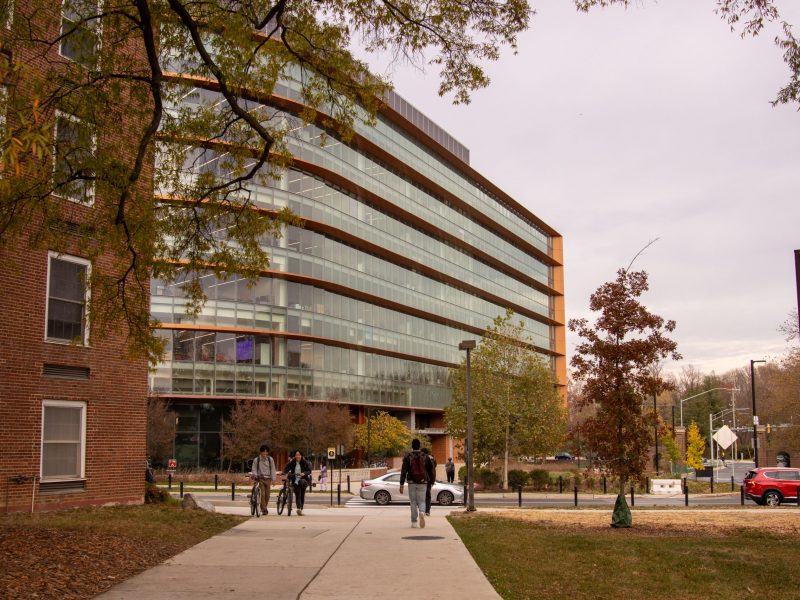By Samantha Subin
For The Diamondback
Legal experts on immigration expressed frustration with Trump administration policy Tuesday at a panel discussion at the University of Maryland.
The panel came a day after the Trump administration announced it would reduce the number of refugees accepted for resettlement in 2019 to 30,000 — a record low since the program’s creation in 1980.
Maureen Sweeney, an associate professor at the University of Maryland Law School, shared with more than 100 attendees at McKeldin Library her experience with appealing cases in immigration courts.
“You have this system where anyone who has contact with the criminal justice system is running a risk that they are going to lose their status,” Sweeney said.
[Read more: Students advocate for more mental health resources for UMD’s undocumented immigrants]
In January 2017, a Trump executive order widened the priority for deportation to include any undocumented immigrant who authorities believe has committed a crime — even if the person hadn’t been charged or convicted.
Attorney General Jeff Sessions announced in May that, under a “zero tolerance” policy, the Justice Department would begin prosecuting every individual who crosses the border illegally. Adults who come to the country illegally with children would be separated from them, Sessions said.
The policy came under sharp scrutiny over the summer after the Associated Press reported that more than 2,000 children had been separated from their parents over a six-week period. But Congress couldn’t reach a deal on immigration reform. Federal court cases have since set deadlines for reuniting migrant children with their parents.
“To this day, we have several hundred children still in government custody without their parents,” Royce Bernstein Murray, policy director at the American Immigration Council, said at the panel. “It will be a stain. We’ll look back on these times as really a shameful moment in American history.”
[Read more: “My intention is to stay here”: A UMD student shares her struggles as a DACA recipient]
The Trump administration has also attempted to eliminate the Obama-era Deferred Action for Childhood Arrivals policy, which granted protection from deportation and eligibility for a work permit to certain immigrants who arrived in the country as minors. Currently, federal courts are requiring the U.S. Citizenship and Immigration Services to continue to accept renewal applications from previous DACA recipients, though the program isn’t accepting any new applicants.
Murray said immigrants and refugees are often maligned as criminals who are “taking advantage of loopholes,” despite their “unequivocal right to apply for asylum.” Families at the border are prosecuted, separated and refused safety, he added.
Another panelist, civil rights attorney Sirine Shebaya, shared her experience challenging government efforts to deter immigrants seeking asylum and the process of expedited removal, in which asylum seekers are granted one interview when they reach the border.
Many parents with “really strong asylum claims” failed interviews because they were “traumatized” by the separation from their children, Shebaya said.
One way to help immigrants is to give them a second chance at asylum where they can present additional information with attorneys present, she said.
“Basically they were not able to take advantage of the one shot at asylum that you get when you present yourself here,” Shebaya said. “That’s one way that you can sort of use the court system to try to get justice for people who have been denied justice.”
Sweeney called out individuals who use immigration as a political issue and aren’t interested in how well the system works.
“They don’t necessarily care whether the system works or not, or they care to the extent that it serves their purposes politically,” Sweeney said. “You have politics actually being a negative force.”
Government and politics professor Robert Koulish stressed the importance of protecting immigrants’ constitutional rights.
“It’s through the Constitution that we get our values as Americans and through which our values are being interpreted through the lens of how we treat each other, how we treat legal subjects,” Koulish said.
Junior communication and public policy major Jonathan Garcia said he learned a great deal about immigration detainment at the panel, and saw opportunities for research in the field.
For Garcia, whose parents are immigrants, immigration is a personal issue.
“One of the panelists talked about how it’s a shame how our country’s immigration policy is at this time, with the detainment and separation of families,” Garcia said. “This kind of hit home to me.”



